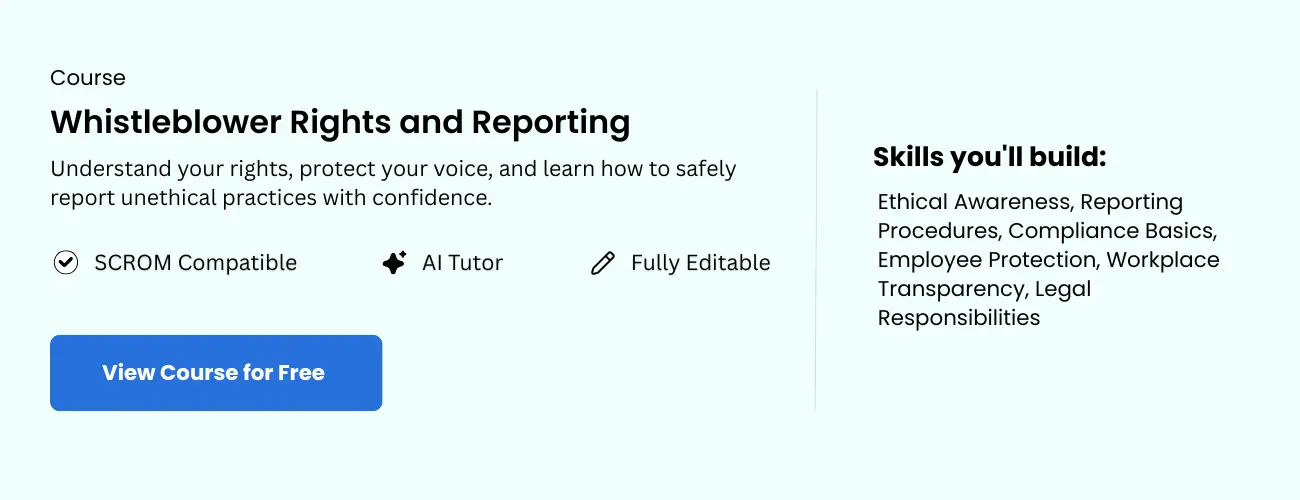
THANK YOU
FOR YOUR INFORMATION
One of our expert will be in touch with you…

Retaliation claims present significant legal and organizational challenges that can threaten a company’s reputation, financial stability, and employee trust. These claims typically arise when employees believe they have faced adverse actions—such as demotion, dismissal, or harassment due to their involvement in protected activities like reporting misconduct or participating in investigations. Recognizing the seriousness of these risks highlights the necessity for proactive measures, including whistleblower training for employees, to ensure legal compliance and uphold high ethical standards within the organization.
The legal framework surrounding retaliation mainly derives from employment laws including Title VII of the Civil Rights Act, the Occupational Safety and Health Act (OSHA), and regulations enforced by the Equal Employment Opportunity Commission (EEOC). These laws prohibit employers from retaliating against employees engaged in protected activities. Non-compliance can lead to costly lawsuits, substantial fines, and mandatory corrective actions. For instance, in 2022, the EEOC resolved over 4,000 retaliation charges, resulting in millions of dollars in settlements—underscoring the significant legal exposure organizations face if retaliation occurs.
Beyond legal consequences, retaliation allegations can damage an organization’s reputation and employee morale. Negative publicity may deter potential talent, erode stakeholder confidence, and lead to increased internal turnover. Moreover, organizations might face heightened scrutiny from regulators, resulting in audits or violations of compliance standards. Addressing retaliation proactively helps mitigate these risks and cultivates a workplace environment rooted in trust, transparency, and ethical conduct.
Ensuring compliance and cultivating an ethical culture requires a comprehensive approach. Key strategies include establishing clear anti-retaliation policies, providing regular whistleblower training for employees, and creating effective reporting mechanisms. Employers should offer accessible channels for employees to report concerns anonymously or openly, with assurances of prompt and impartial investigations. Conducting periodic audits of HR practices and holding leadership accountable further reinforce a zero-retaliation culture. Embedding these measures into organizational policies significantly reduces the likelihood of retaliation claims and related risks.
Must Read: Is Your Whistleblowing Policy Outdated? Stay Relevant & Effective
Understanding early warning indicators and common scenarios that lead to retaliation claims is vital for organizations committed to maintaining a respectful and compliant workplace. Detecting these signs early enables prompt intervention, reducing legal risks and strengthening transparency and trust.
Employers should stay alert to behavioral and organizational cues suggesting potential retaliation. Recognizing these signs early can prevent escalation and demonstrate proactive concern for employee well-being.
Several workplace scenarios are particularly vulnerable to retaliation allegations when not managed properly. These include:
To prevent retaliation claims, organizations should establish clear policies, conduct regular training, and nurture a workplace culture that discourages retaliatory behavior. Early detection of warning signs and swift intervention are crucial. Creating an environment where employees trust that concerns will be addressed objectively and confidentially fosters compliance and reduces legal exposure.

Building a transparent workplace promotes ethical conduct, preserves organizational integrity, and ensures adherence to legal standards. The following key strategies are essential:
Policies serve as the foundation for transparency. They should articulate expectations related to ethics, conduct, and compliance standards clearly. Effective policies are:
Training enhances awareness of policies, legal obligations, and ethical expectations. Successful training initiatives should be:
Confidential and accessible channels encourage employees to report concerns safely. Essential features include:
Paradiso’s comprehensive training solutions are designed to equip organizations with the tools needed to prevent retaliation incidents and foster a culture of respect and transparency.
Retaliation occurs when employers take adverse actions against employees who report violations. According to EEOC data, retaliation claims comprise a significant portion of workplace complaints, often leading to costly legal processes and reputational harm. Prevention efforts strengthen trust and employee engagement.
Paradiso offers specialized e-learning courses focused on recognizing subtle forms of retaliation, understanding legal limits, and promoting a safe reporting environment. Integrating these into onboarding and ongoing training emphasizes a proactive approach.
Courses highlight the importance of ethical leadership and clear communication channels. Proper training ensures managers and staff can handle complaints ethically and escalate issues appropriately, reducing retaliation risks.
Training modules incorporate the latest legal updates and best practices, aiding organizations in meeting federal and state anti-retaliation regulations. Consistent updates keep staff informed and compliant.
Modules provide employees with understanding of their rights and organizational policies, supplemented by interactive scenarios that boost confidence to report concerns safely.
Tracking engagement, assessments, and behavioral changes helps organizations refine their anti-retaliation strategies over time, ensuring ongoing effectiveness.
Leveraging Paradiso’s courses on retaliation prevention helps organizations proactively address risks, promote a respectful culture, and ensure compliance. Well-trained employees and leadership are vital to maintaining a retaliation-free workplace environment. Resources like Paradiso Course Catalog offer targeted training programs that drive cultural change, support organizational integrity, and uphold workplace standards.
Proactive prevention is essential for safeguarding employees and the organization against retaliation risks. Addressing potential issues early not only creates a safer, healthier workplace but also reduces costs associated with misconduct incidents and boosts overall productivity. Consistent application of prevention strategies reflects a commitment to employee well-being and organizational resilience. Resources like Paradiso Course Catalog offer tailored programs that support ongoing safety and compliance efforts. Embracing these proactive measures fosters a culture of continuous improvement, ensuring long-term organizational success and sustainability.